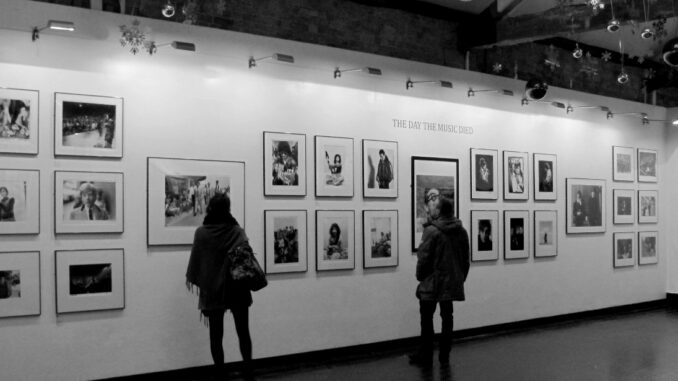
As Don McLean sings in American Pie, the line becomes title to the new exhibition at Proud Galleries, Camden, on an extended show from 14th December 2011 until 4th March 2012. Suggesting a time when not merely music but mainly a musician has died, this collection plays a tribute to the vast circle of late talents that undoubtedly shaped the face of music. Let us also mention the fact that the whole idea was inspired by the tragic passing of Amy Winehouse earlier in July this year; the Camden songstress was beloved at Proud, often hanging out in the premises, performing before the fame but also and most memorably at the venue’s 2nd birthday in July 2010 together with Professor Green.
With her death Amy joins the so called 27 Club, to which take part 42 more or less known musicians who died at the age of 27. Most notably Kurt Cobain (d. 1994), Jim Morrison (d.1971), Janis Joplin (d. 1970), Jimi Hendrix (d. 1970), Brian Jones (d. 1969) – all on show in The Day the Music Died with limited edition prints by renowned photographers such as Steve Double, Frank Lisciandro, Bruce Fleming. The myth of the pop culture artist duly disappearing in those late 20s seems to be a sinister reminder of the counter-effects of being talented, famous and ultimately unique. The pictures exhibited, on the other hand, display a performed art that only a keen-eyed photo-journalist could catch in those rapid moments.
The exhibition continues with the celebration of all artists that have had a strong and changing impact on music. To start with: Buddy Holly, deceased at the young age of 23 in a plane crash, leader of the rock’n’roll movement and inspirational to a pretty strong following of musicians (i.e. the Beatles and the Rolling Stones); Elvis Presley in 1958 speaking in front of a happy audience – in a way that makes him fondly remembered; Bob Marley photographed by Kim Gottlieb Walker in 1975 during her Jamaican trips following the rise of the reggae icon; a big (35’’ X 45’’) Jimi Hendrix by David Redfern playing at the Royal Albert Hall in 1969 and a smaller one by Bruce Fleming presenting the guitarist at Monterey Festival minutes before the crazy burning and smashing of his instrument; Frank Sinatra by Terry O’Neal walking along a public of bathers at Miami Beach in 1968, accompanied by some very stylish Bodyguards (I also recommend Screen Sirens and Rock Rebels by Terry O’Neal, currently on show at Proud Chelsea); Johnny Cash strolling in an Australian desert-land with his guitar but also pictured in a larger multi-faced portrait. My list goes on with prints of Nina Simone, Freddie Mercury, John Lennon, Brian Jones, Michael Jackson, Syd Barrett, Joe Strummer, Nick Drake, Keith Moon… and so many more you can only go to see!
There is definitely one for any type of fan. However it seems through rousing some sadness in the depiction of a gone talent that parts of this exhibition contribute to the romantic idea of the troubled artist. See Ian Curtis for example, who committed suicide on the edge of Joy Division’s first American tour: the singer’s epilepsy diagnosis – which was a big problem for the energetic performances of the band on stage – and the crushing between his wife and his music, must have left the singer with that only tragic choice. The single Love Will Tear Us Apart became a huge hit after the musician’s death. See also Kurt Cobain, who shot himself after other suicidal attempts, drugs struggles and musical depression: his death certainly added to the fascination with one of the greatest singers and guitarist in history.
I am no musician (and for sure not struggling with fame!), but I may have a surrealist idea of what comes with popularity and musical pressures. If we like to think of the idea of the genius, we also know that it does not come in simple forms: money, alcohol and drugs, depression, losing track… Therefore, death seems to become an escape to all that is trivial for someone with a deep artistic sensitivity and with difficulties in dealing with real life. This is only to explain the premature parting; for accidental or elderly age reasons, I have no comments – apart from the standard “C’est la vie”.
The splendid commemoration of these iconic musicians’ lives is a highly recommended experience to anyone from 0 to 100 years old – music fan or similar. Set in a grade II listed Horse Hospital in the heart of Camden’s Stables Market, The Day the Music Died presents you with the opportunity to go through the best stars of all our times – with themes that inspire contemplation, admiration and longing for the artist that is gone.
The Day the Music Died is on show at Proud Galleries Camden from 14th December 2011 until 4th March 2012.
The Horse Hospital, Chalk Farm Road NW1 8AH
https://www.proudonline.co.uk/exhibition-The-Day-the-Music-Died_81.aspx

Leave a Reply